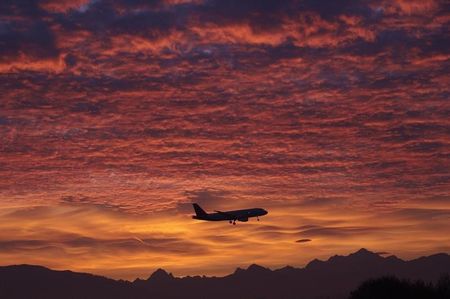By Tim Hepher and Victoria Bryan
PARIS/BERLIN (Reuters) - Airlines urged the European Union on Thursday to press ahead with plans to merge national air corridors, rekindling debate about a reform that risks confrontation with air traffic controllers over safety and jobs.
The call came as EU transport ministers gathered in Rome for informal talks to try to accelerate a plan to integrate some of the world's most crowded airways, which has drifted since the so-called Single European Sky scheme was launched a decade ago.
A group representing 30 European airlines has written to the EU's 28 nations urging them to end a deadlock which it blames on a "lack of political will", according to a copy seen by Reuters.
The Association of European Airlines (AEA) says streamlining Europe's jigsaw of national air corridors would save airlines 3 billion euros ($3.7 billion) a year and consumers another 6 billion euros.
Under the current system, responsibility for airspace belongs to each country, which usually manages its flight paths and charges navigation and terminal fees, estimated by the Eurocontrol air traffic agency at some 8 billion euros a year.
The Single European Sky proposal calls for airspace to be arranged in trans-national "blocks" in what is seen as the most radical shake-up of European's aviation system for decades and a precursor to greater automation.
"After 10 years there has been almost zero progress," Mildred Troegeler, the AEA's head of operations, told Reuters.
"This would bring huge benefits to consumers and the environment, including 8 million tonnes fewer CO2 emissions. Consumers are suffering 11 million minutes of unnecessary flight delays every year," she said in an interview.
Airlines say the European Sky scheme would allow them to plan more direct routes and make large savings in time, fuel and emissions. They contrast the slow progress in redrawing Europe's aviation map with the borderless Schengen Area of 26 nations.
"On the ground we have no more borders, but in the sky we remain nationalistic," said AEA spokesman Geert Sciot.
SAFETY DEBATE
The proposals have led to strikes by some of Europe's 14,000 air traffic controllers, especially in France where union leaders say it is a cost-cutting exercise and would harm safety. Airlines insist safety would actually increase under the plan.
"There are 63 air traffic control centres in Europe and 20 in the United States," said Roger Rousseau, national secretary of the French SNCTA air traffic controllers' union. "So we ask a simple question: where will the number of centres be cut?"
Although the United States has more flights per day, the density of traffic in some of Europe's airways is among the highest in the world, according to air traffic controllers.
In Germany, a spokesman for air traffic controllers union GdF said forcing air traffic controllers to provide services at lower costs would mean less money available for investment.
"They still want us to have the most up-to-date equipment and process more traffic with fewer staff, and that simply doesn't work," he said.
The airways plan is one of the most sensitive dossiers awaiting the EU's new Transport Commissioner, Violeta Bulc of Slovenia, and Friday's meeting will seek to overcome differences between member states over how it should be implemented.
Critics among EU member nations say the latest version of the scheme, known as SES 2+, is based on over-optimistic traffic forecasts and could lead to over-regulation.
Facing union opposition and diverse labour contracts, France and Germany have voiced most concerns, while the UK and current EU president Italy broadly back the new overhaul, experts say.

(1 US dollar = 0.8044 euro)
(Additional reporting by Julia Fioretti and James Mackenzie; editing by David Clarke)
